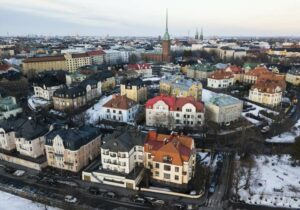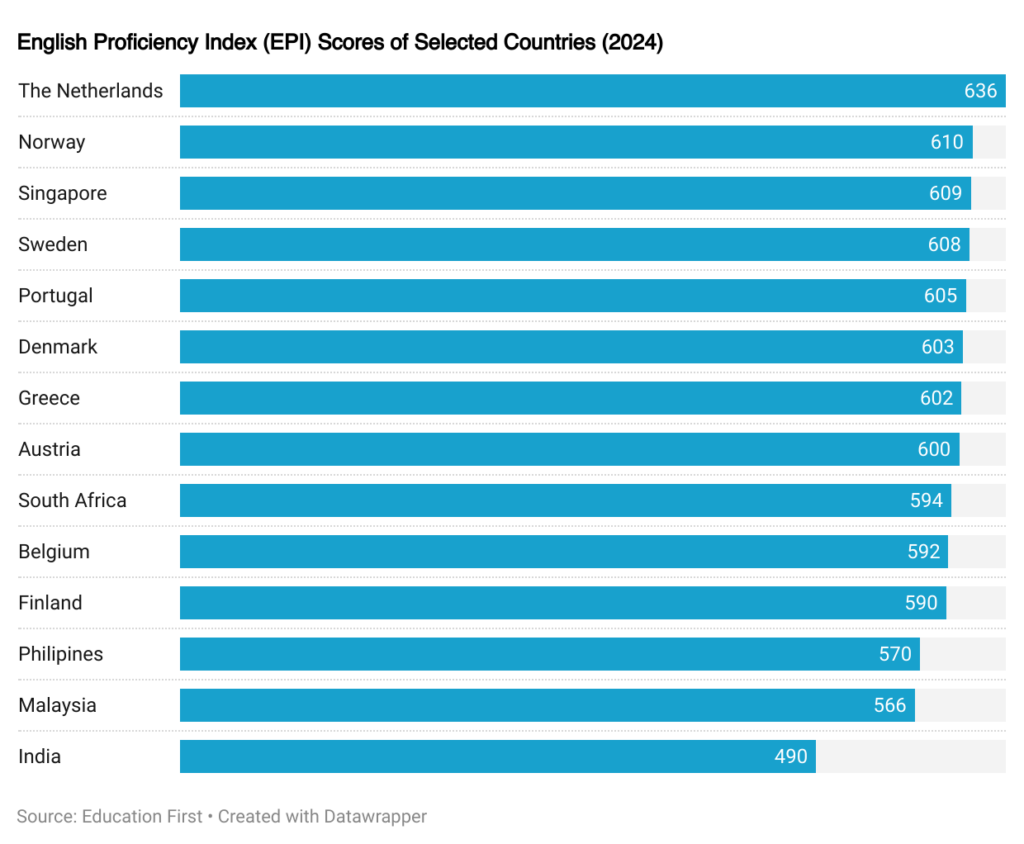English as an International Language
English has become a global language due to historical, economic, and cultural factors. The British Empire spread English across its colonies, making it the official language in many countries.
According to the Education First English Proficiency Index (EPI) report, which was recently published, “the worldwide level of English proficiency has declined for the fourth year running, with 60% of countries in the index scoring lower this year than last.”
Despite these drops, English still proves to be a language that is needed to help stimulate economic growth, as it is one of the indicators of a country’s ability to produce goods and services. The EPL report also emphasized that English “correlates well to national investment in helping people achieve their full potential by providing education, healthcare, and a decent standard of living.”
It’s also important for countries to attract English-speaking students from all over the world as they are essential to building local economies. For example, according to the Global Education Report, international students brought $44.5 billion to the U.S. economy in 2023, while the UK and Australia generated £30 billion and AUD 39 billion, respectively.
Beyond financial gains, international students enhance academic environments, foster cultural exchange, and strengthen diplomatic ties.
16 Best English Speaking Countries to Live in
For expats, choosing a new home goes beyond just learning the national language. It’s about finding a country with welcoming communities and a strong level of English proficiency. Many countries worldwide, even those where English isn’t the national language, offer great environments for English speakers due to their language skills.
These countries often have large populations who can communicate easily in English, especially in urban areas. Many also have educational systems that emphasize learning English from a young age, making them a great choice for newcomers. When deciding where to live, it’s important to consider how well you can fit in both socially and professionally, as this will make your new life much easier. This is why we have included information from our Quality of Life Index created by our Global Intelligence Unit. This index is made up of metrics like environmental sustainability, the cost of living, infrastructure, and personal and political freedoms.
1. The Netherlands
- English Proficiency Index ranking: 1
- Quality of Life Index ranking: 7
- Average Cost of living: $2,200 – $2,500

The top English-speaking cities in The Netherlands are Amsterdam, Utrecht, Rotterdam, and The Hague.
It makes communication easy for expats and international business professionals. English is taught as a core subject in schools from a young age, and many university programs are offered in English to attract international students.
The Dutch society puts a lot of emphasis on multiculturalism and open-minded attitudes, which makes it an attractive destination for expats. With its strong economy, high standards of living, and strategic location as a gateway to Europe, the Netherlands offers a dynamic and innovative environment for both living and working.
2. Sweden
- English Proficiency Index ranking: 4
- Quality of Life Index: 1
- Average Cost of living: $2,400 – $2,800

This makes Sweden an easily accessible and welcoming destination for English speakers. The country is renowned for its progressive social policies, innovation, and high quality of life. It is a leading nation in areas such as technology, environmental sustainability, and social welfare.
All these factors come together to make Sweden a highly attractive destination for expats looking for a society that balances economic growth with social and environmental responsibility. The vibrant cultural scene, ranging from historic landmarks to contemporary music and art, adds further to the enriching expat experience.
3. Denmark
- English Proficiency Index ranking: 7
- Quality of Life Index: 4
- Average Cost of living: $2,600 – $3,100

Denmark is known for its high quality of life, advanced healthcare and education systems, and strong focus on environmental sustainability. It has a competitive economy and a growing job market in sectors such as biotech, IT, and renewable energy.
The capital city, Copenhagen, is particularly famous for its innovation in clean technologies and culinary scene. For expats, Denmark’s family-friendly policies, efficient public services, and vibrant cultural life make it one of the best European countries to live in.
4. Norway
- English Proficiency Index ranking: 2
- Quality of Life Index: 8
- Average Cost of living: $2,800 – $3,200

Norway’s economy is supported by its oil and gas sector, as well as growing industries in information technology and sustainable energy. The country offers breathtaking natural landscapes, a high standard of living, and a strong welfare state, which are attractive to expats seeking a quality life and outdoor recreational opportunities.
Education is a top priority, with public universities offering many courses in English to attract international students. Norway’s commitment to environmental protection and social welfare is evident in its policies and lifestyle, which align with many important global community values.
5. Finland
- English Proficiency Index ranking: 14
- Quality of Life Index: 2
- Average Cost of living: $2,200 – $2,700

English is widely used in business, education, and by government officials, making it easy for English-speaking expats to adapt. Finland is a leader in the IT sector, supports environmental technologies, and is committed to research and development.
The country also offers a one-of-a-kind cultural experience, from its sauna culture to its thriving arts scene. For expats, Finland is a safe, efficient, and innovative environment ideal for families and professionals. It is also a very safe country and has earned its title as one of the safest English-speaking countries.
6. Belgium
- English Proficiency Index ranking: 13
- Quality of Life Index: 25
- Average Cost of living: $2,100 – $2,600

This makes Belgium, especially its capital, a hub for international diplomacy, business, and European politics. The city has a cosmopolitan nature due to the presence of many international organizations, including the EU and NATO, which also provide numerous opportunities for expats in various professional fields. Belgium is rich in cultural heritage and has a renowned gastronomy.
It is conveniently located for travel within Europe. Its historical cities, such as Bruges and Antwerp, offer a high quality of life with a blend of historical architecture and modern amenities.
7. Singapore
- English Proficiency Index ranking: 3
- Quality of Life Index: 124
- Average Cost of living: $2,500 – $3,200

Despite the presence of multiple languages, English is the predominant language for administration and is widely used in business, education, and the public sector.
This makes Singapore an ideal location for English-speaking expats. The country’s strategic location, strong economy, and high living standards have attracted a diverse international workforce and multinational companies. It is also a great country for crypto investors because of its favorable tax incentives and strong legal regulations.
8. Portugal
- English Proficiency Index ranking: 6
- Quality of Life Index: 6
- Average cost of living: $1,070 to $1,600
Portugal is an excellent choice for English speakers, as many people speak English, especially in urban areas like Lisbon and Porto. While Portuguese is the official language, English is widely used in business, tourism, and education.
The country offers a low cost of living compared to other Western European nations, allowing expats to live comfortably. Portugal also provides two great options for residency: the Portugal Golden Visa, which offers residency through investment, and the Portugal D7 Visa, which is designed for retirees and passive income earners. These visas make it easier for foreigners to obtain residency and enjoy the benefits of living in Portugal, making it an English-speaking country with a low cost of living and high quality of life.
With its stunning landscapes, excellent healthcare system, and large expat communities, Portugal is a great place for those seeking a balance of work and relaxation. Whether you’re looking to retire or work remotely, Portugal offers a welcoming environment for English speakers to build a fulfilling life. It is also seen as one of the cheapest European countries to live in.
9. India
- English Proficiency Index ranking: 69
- Quality of Life Index: Low
- Average Cost of living: $600 – $1,200

The urban and educated populations understand and speak English widely, which makes it easier for expats to conduct business and interact with locals on a daily basis.
The country’s vibrant cultural heritage and fast-paced economic growth make it an exciting destination for both professionals and travelers.
10. Philippines
- English Proficiency Index ranking: 22
- Quality of Life Index: 95
- Average Cost of living: $800 – $1,500

English is widely used in government, business, and education, creating a friendly and welcoming environment for English speakers.
The country’s flourishing economy, breathtaking scenic views, and welcoming hospitality make it an attractive destination for expats. The Philippines is also attractive because it offers a low living cost.
11. Malaysia
- English Proficiency Index ranking: 26
- Quality of Life Index: 110
- Average Cost of living: $800 – $1,500

Malaysia is a multicultural nation with a diverse cultural heritage, a growing economy, and breathtaking landscapes.
The country attracts expats and tourists from bustling cities to serene beaches, many of whom are from other English-speaking countries.
12. Australia
- English Proficiency Index ranking: –
- Quality of Life Index: 24
- Average Cost of living: $2,500 – $3,200

Its cultural diversity and wide range of climates make it an attractive option for expats from all over the world. Major cities like Sydney, Melbourne, and Brisbane have vibrant urban environments with several career opportunities, particularly in the technology, healthcare, and education sectors.
Additionally, Australia’s emphasis on outdoor lifestyles and sports makes it an appealing choice for those seeking a balance between work and leisure.
13. Canada
- English Proficiency Index ranking: —
- Quality of Life Index: 12
- Average Cost of living: $2,000 – $2,500

The country’s policies are inclusive, and its society is multicultural, offering extensive social services such as healthcare and education. Immigrants are welcomed in cities like Toronto, Vancouver, and Montreal, which provide diverse cultural experiences and a friendly atmosphere.
Canada’s vast landscapes also offer numerous recreational opportunities, making it an ideal destination for expats seeking both urban and natural environments. Since Canada also has many similarities with America, it is often considered one of the best countries for Americans to retire.
14. New Zealand
- English Proficiency Index ranking: –
- Quality of Life Index: 16
- Average Cost of living: $2,300 – $2,800

The country’s economy is mainly based on agriculture, tourism, and film production, providing diverse employment opportunities. Wellington and Auckland are major centers for technology startups and innovation.
New Zealand’s dedication to promoting work-life balance, health, and education makes it an attractive choice for both families and professionals.
15. United Kingdom
- English Proficiency Index ranking: –
- Quality of Life Index: 9
- Average Cost of living: $2,100 – $2,600

The UK’s comprehensive National Health Service (NHS), which is free at the point of use, and its emphasis on high educational standards across numerous prestigious universities are significant attractions.
Despite the high living costs in major cities, the UK remains an attractive destination for its diverse culture, strong labor protections, and vast travel connections to Europe and beyond.
16. Ireland
- English Proficiency Index ranking: –
- Quality of Life Index: 11
- Average Cost of living: $2,300 – $2,800

Dublin, as the capital, hosts several multinational corporations offering ample employment opportunities. Ireland’s rich cultural heritage in literature, music, arts, scenic beauty, and relaxed lifestyle add to its charm. The country also benefits from being an EU member, which provides expats with opportunities to travel and work throughout Europe.
City | EPI Scores |
Amsterdam | 657 |
Stockholm | 617 |
Copenhagen | 633 |
Helsinki | 627 |
Brussels | 580 |
Lisbon | 626 |
New Delhi | 406 |
Manila | 592 |
Kuala Lumpur | 584 |
Oslo | 614 |
Considerations about English-speaking Countries
If you are planning to immigrate to an English-speaking country, several important factors should be considered to ensure a smooth transition. By considering these factors, you can adequately prepare for the opportunities and obstacles that come with moving to a new country and ensure that your decision matches your personal and professional goals.
Visa requirements and immigration policies
Each country has its own set of immigration laws and visa requirements. Research these thoroughly to understand the types of visas available, the application process, and the likelihood of securing permanent residency or citizenship if that’s your goal.
Job opportunities
Look into the job market of the potential host country, especially in your field of expertise. Some countries may offer numerous opportunities in certain sectors, while others might be more competitive or restricted.
Cost of living
This includes housing, food, healthcare, transportation, and education costs. High living standards can often mean high costs of living, so it’s essential to consider whether your potential earnings will comfortably cover your expenses and lifestyle expectations.
Healthcare system
Evaluate the healthcare services of the country, including the quality of care, accessibility of services, and whether healthcare is publicly funded or requires private health insurance.
Cultural adaptation
Consider how easy it will be to adapt to the local culture. This includes language differences in English-speaking countries, social norms, and the general lifestyle. Community support structures and the presence of other expatriates can also impact your integration.
Political stability and safety
The political environment can affect everything from job security to personal safety. Stable governance usually indicates a secure environment for immigrants.
Tax system
Understanding the tax system is crucial as it will affect your income and financial planning. Some countries have double tax agreements with other nations, which could be beneficial.
Climate and environment
Depending on your preference and tolerance, the climate can play a significant role in your comfort and lifestyle in a new nation. Consider weather patterns and the natural environment, as they can also impact your health and leisure activities.
Countries where English is Rarely Spoken
English is a widely spoken language across the globe and is commonly used in international business, education, and media. However, there are several countries where English is not commonly used due to various cultural, political, and educational factors.
These countries often have strong local languages and educational systems that focus on native languages or other international languages like Russian or Chinese. While English may be taught in schools in these countries, it is not always used in daily life, which limits its usefulness in casual and business communication within these regions.
North Korea: Heavily isolated, North Korea prioritizes Korean in all aspects of life, with very limited exposure to English due to stringent government policies on foreign interaction.
Turkmenistan: In Turkmenistan, Turkmen and Russian are the dominant languages. English has minimal presence, used occasionally in foreign trade contexts but not in general public life or education.
Bhutan: English is taught in schools in Bhutan, but Dzongkha and Sharchop remain the principal languages. Speaking English is used mainly in administrative settings and in the tourism sector.
Myanmar: Burmese is the local language, and while speaking English is included in school curricula, its practical use is confined mostly to major urban and tourist areas, not penetrating deeply into local daily use.
Japan: Despite being an economic powerhouse, Japan sees limited day-to-day use of English. The language is often perceived as a difficult foreign language learned mainly for academic and professional reasons rather than for everyday communication. Japanese remains the most widely-spoken local language.
How Can Global Citizen Solutions Help You?
Global Citizen Solutions is a boutique migration consultancy firm with years of experience delivering bespoke residence and citizenship by investment solutions for international families. With offices worldwide and an experienced, hands-on team, we have helped hundreds of clients worldwide acquire citizenship, residence visas, or homes while diversifying their portfolios with robust investments.
We guide you from start to finish, taking you beyond your citizenship or residency by investment application.
Frequently Asked Questions About English-Speaking Countries to Live
What are the best English countries for expats?
Popular choices include Australia, Canada, New Zealand, the United Kingdom, and Ireland. These countries offer a high quality of life, robust economies, excellent healthcare, and vibrant cultural experiences, making them attractive for expats.
Which English-language country is the easiest to immigrate to?
This varies based on your circumstances, but countries like Canada and New Zealand are known for their relatively straightforward and transparent immigration processes. They have points-based systems that favor skills, experience, and the potential to contribute to the economy.
What are the major challenges of living in an English-speaking country?
Common challenges include adjusting to cultural differences, managing healthcare needs, navigating legal and immigration systems, and in some cases, coping with high living costs, especially in major cities.
How do job opportunities in English-language countries compare?
Job opportunities can vary greatly depending on local economic conditions and your professional background. Countries like Australia and Canada often have a demand for skills in technology, engineering, healthcare, and finance sectors. It’s important to research job markets in specific regions within a country to align with your career.
What should expats know about healthcare in English-language countries?
Healthcare systems in English-speaking countries can vary widely. Canada and the UK have publicly funded healthcare systems, where residents have access to most services at no direct cost. Australia provides a mix of public and private healthcare, with the option to add private insurance for more services.
The United States relies heavily on private health insurance, which can be expensive but offers access to some of the best medical care in the world. Ireland also offers a mix, with public healthcare available but often supplemented by private health insurance to reduce waiting times and access more services.
What are the Best countries to move to from the US that speak English?
The best countries to move to from the US that speak English are:
- The Netherlands
- Sweden
- Denmark
- Norway
- Finland
- Belgisum
- Singapore
- Portugal
- India
- Philippines
- Malaysia
- Australia
- Canada
- New Zealand
- United Kingdom
- Ireland





